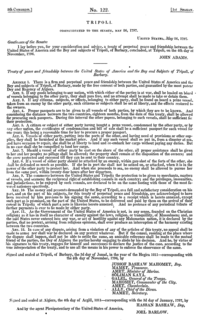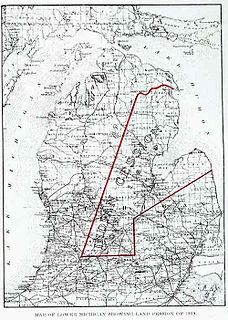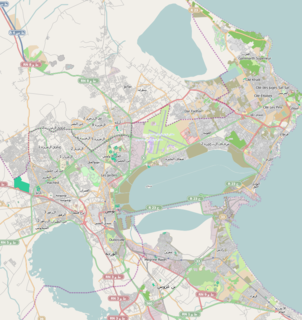External links
| | This article relating to the history of the United States is a stub. You can help Wikipedia by expanding it. |
| | This Ottoman Empire–related article is a stub. You can help Wikipedia by expanding it. |
The Treaty with Tunis was signed on February 24, 1824 (24 Ramada II, A. H. 1239), between the United States of America and the "Barbary State" of Tunis, nominally part of the Ottoman Empire.
Ratified by the United States between January 13 and 21, 1825

Philip III, called the Bold, was king of France from 1270 until his death in 1285. His father, Louis IX, died in Tunis during the Eighth Crusade. Philip, who was accompanying him, returned to France and was anointed king at Reims in 1271.

The Eighth Crusade was a crusade launched by Louis IX of France against the Hafsid dynasty in 1270. The Eighth Crusade is sometimes counted as the Seventh, if the Fifth and Sixth Crusades of Frederick II are counted as a single crusade. The Ninth Crusade is sometimes also counted as part of the Eighth. The crusade is considered a failure as Louis died shortly after arriving on the shores of Tunisia, with his disease-ridden army dispersing back to Europe soon afterwards.
The Treaty of Paris, signed in Paris by representatives of King George III of Great Britain and representatives of the United States of America on September 3, 1783, officially ended the American Revolutionary War. The treaty set the boundaries between the British Empire in North America and the United States of America, on lines "exceedingly generous" to the latter. Details included fishing rights and restoration of property and prisoners of war.

The First Barbary War (1801–1805), also known as the Tripolitan War and the Barbary Coast War, was the first of two Barbary Wars, in which the United States and Sweden fought against the four North African states known collectively as the "Barbary States". Three of these were autonomous, but nominally provinces of the Ottoman Empire: Tripoli, Algiers, and Tunis. The fourth was the independent Sultanate of Morocco.

The Second Barbary War (1815) or the U.S.–Algerian War was fought between the United States and the North African Barbary Coast states of Tripoli, Tunis, and Algiers. The war ended when the United States Senate ratified Commodore Stephen Decatur’s Algerian treaty on 5 December 1815. However, Dey Omar Agha of Algeria repudiated the US treaty, refused to accept the terms of peace that had been ratified by the Congress of Vienna, and threatened the lives of all Christian inhabitants of Algiers. William Shaler was the US commissioner in Algiers who had negotiated alongside Decatur, but he fled aboard British vessels during the Bombardment of Algiers (1816). He negotiated a new treaty in 1816 which was not ratified by the Senate until 11 February 1822, because of an oversight.

The Treaty of Tripoli was signed in 1796. It was the first treaty between the United States of America and Tripoli to secure commercial shipping rights and protect American ships in the Mediterranean Sea from local Barbary pirates.

The Treaty of Saginaw, also known as the Treaty with the Chippewa, was made between Gen. Lewis Cass and Chief Mash Kee Yosh, Chief John Okemos, Chief Wasso and other Native American tribes of the Great Lakes region in what is now the United States, on September 24, 1819, proclaimed by the President of the United States on March 25, 1820, and placed in law as 7 Stat. 203.
The Barbary Treaties refer to several treaties between the United States of America and the semi-autonomous North African city-states of Algiers, Tunis, and Tripoli, under the rule of the Ottoman Empire, known collectively as the Barbary States.
The Treaty with Tunis was signed on August 28, 1797, between the United States of America and the "Barbary State" of Tunis, nominally part of the Ottoman Empire. As the treaty provided in Article One:
James Leander Cathcart was a diplomat, slave, and sailor. He is notable for his narrative as a slave in Algiers for eleven years.

The French Conquest of Tunisia occurred in two phases in 1881: the first consisting of the invasion and securing of the country before the signing of a treaty of protection, and the second consisting of the suppression of a rebellion. The French protectorate of Tunisia that was established lasted until the independence of Tunisia on 20 March 1956.

The Conquest of Tunis in 1535 was a successful capture of Tunis, then under the control of the Ottoman Empire, by the Habsburg Empire of Charles V and its allies.
MS Tunis was a Danish motor ship in commercial service for Det Forenede Dampskibs Selskab (DFDS), Copenhagen, Denmark, as a cargo ship delivered to DFDS on 15 January 1936. Tunis was the first of four sister ships, two built in 1936 and two in 1938, that operated for DFDS. The ship's normal service was Copenhagen to the Mediterranean until war in Europe when all four of the ships were put into Atlantic service.

In July 2001, President Abdelaziz Bouteflika became the first Algerian President to visit the White House since 1985. This visit, followed by a second meeting in November 2001, and President Bouteflika's participation at the June 2004 G8 Sea Island Summit, is indicative of the growing relationship between the United States and Algeria. Since the September 11 attacks in the United States, contacts in key areas of mutual concern, including law enforcement and counter-terrorism cooperation, have intensified. Algeria publicly condemned the terrorist attacks on the United States and has been strongly supportive of the international war on terrorism. The United States and Algeria consult closely on key international and regional issues. The pace and scope of senior-level visits has accelerated.

Tunisia – United States relations are bilateral relations between Tunisia and the United States.

NATO is an international alliance that consists of 30 member states from North America and Europe. It was established at the signing of the North Atlantic Treaty on 4 April 1949. Article Five of the treaty states that if an armed attack occurs against one of the member states, it shall be considered an attack against all members, and other members shall assist the attacked member, with armed forces if necessary.

Omar Agha was the Dey of the Deylik of Algiers from April 1815 to September 1817, after the assassination of his predecessor Mohamed Kharnadji on 7 April 1815, who had been in office for only 17 days.

Carthage is a commune in Tunis Governorate, Tunisia. It is named for, and includes in its area, the archaeological site of Carthage.
The Arab–Israeli normalization refers to the peace efforts and treaties between the member states of the Arab League and Israel, ending the Arab–Israeli conflict. Since the 1970s, there has been a parallel effort made to find terms upon which peace can be agreed to in the Arab–Israeli conflict and also specifically the Israeli–Palestinian conflict. Over the years numerous Arab League countries have signed peace and normalization treaties with Israel, beginning with the Egypt–Israel peace treaty (1979). Despite the failure to implement the Israeli-Lebanese peace accords (1983), more treaties continued with the Israeli-Palestinian peace process (1991-present), the Jordan–Israel peace treaty (1994), the Abraham Accords normalizing relations between Israel-United Arab Emirates and Israel-Bahrain (2020), the Israel–Sudan normalization agreement (2020) and the Israel–Morocco normalization agreement (2020). Moreover, numerous Arab League members established semi-official relations with Israel, including Oman and Saudi Arabia.